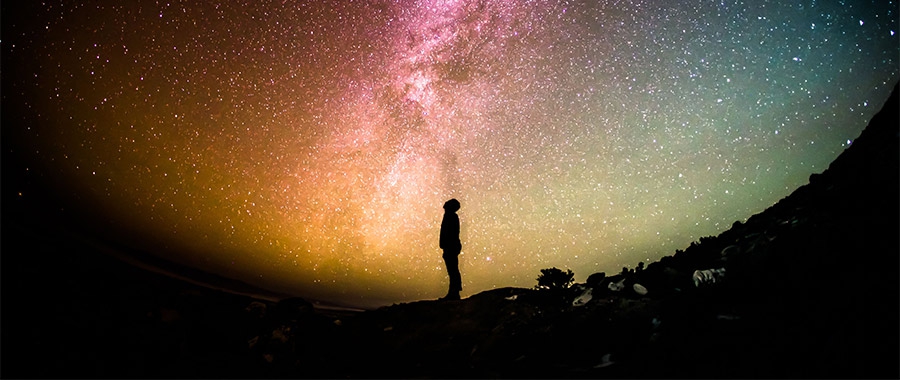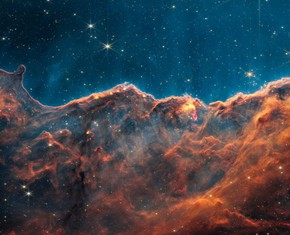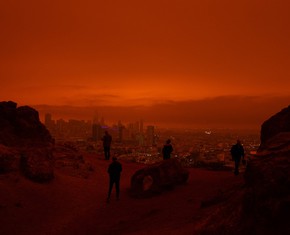The views expressed in our content reflect individual perspectives and do not represent the authoritative views of the Baha'i Faith.
In the 20th century, Newton’s three-dimensional infinite universe seemed to have been destroyed. His laws of gravity had been usurped by the theory of general relativity. The ether had vanished.
Quantum mechanics would soon proceed from theoretical mind experiments to the construction of particle accelerators and nuclear fission. At the same time, a good many imminent surprises awaited scholars in the evolving fields of astrophysics and cosmology, surprises that would call into question some of the certitude with which so many had accepted this revised (and presumed final) quantum vision of creation.
Newton had assumed that the system he observed was stable and changeless. Einstein believed—as the Baha’i teachings repeatedly say—that nothing in the universe is static:
This phenomenal world will not remain in an unchanging condition even for a short while. Second after second it undergoes change and transformation. Every foundation will finally become collapsed; every glory and splendor will at last vanish and disappear, but the Kingdom of God is eternal and the heavenly sovereignty and majesty will stand firm, everlasting. Hence in the estimation of a wise man the mat in the Kingdom of God is preferable to the throne of the government of the world. – Abdu’l-Baha, Tablets of the Divine Plan, pp. 79-80.
A scientific theory thus emerged that the entire universe might be either expanding or contracting, composing or decomposing, if, by definition, it could not be stationary. The confluence of a sequence of discoveries proved Einstein, and the Baha’i view, correct.
An important part of the sequence begins with a discovery by Austrian physicist Christian Doppler in 1842. By employing a spectroscope to examine spiral nebulae, he discovered that the light emitted from these nebulae shifted toward the red end of the spectrum—that is, the light assumed a lower frequency. Were these nebulae at a constant distance, the spectral lines would remain constant, or if the nebulae were approaching the observer, the light would shift towards the blue end of the spectrum and become higher in frequency. The “Doppler Effect” also holds true for sound and you can observe it, for example, in the way the sound of an approaching or receding noise from a truck on the highway assumes different frequencies when it passes us by.
Then, in the early 1920’s, while working at the Mount Wilson Observatory in California, Edwin Hubble calculated that some of the “nebulae” that Doppler had examined were actually distant galaxies outside our own Milky Way. This discovery in itself revised and expanded existing cosmological theory–that there are many galaxies, not just one. Shortly afterwards, Hubble discovered that the redshift in the light from these galaxies indicates that they are receding rapidly from our own galaxy. This observation seemed to confirm Einstein’s theory that the universe is not static, and it seemed to indicate as well that the universe is expanding. The more distant the galaxy, the more rapidly it speeds away from us. Indeed, his observation about the relation of speed to distance became known as the “Hubble Constant.”
Of course, this same observation could also be seen as confirming Newtonian physics, since the force of gravity is proportional to the mass of an object and the distance from the object. For example, a spaceship must acquire “escape velocity” to break free of the Earth’s gravitational pull, but once it has sufficiently distanced itself from the planet, the same pull, though extant, has no appreciable effect. Of course, since no inertial frame of reference exists from which to assess this motion, we cannot assume that these galaxies are breaking free of attraction to the Milky Way galaxy. Likewise, according to the Newtonian model, they might be attracted to something larger that we cannot yet detect.
Reconciliation and Reciprocity
To name and to quantify is clearly one expression of the fact that science—the desire to understand and describe reality—is inherent in humankind:
Science is the first emanation from God toward man. All created beings embody the potentiality of material perfection, but the power of intellectual investigation and scientific acquisition is a higher virtue specialized to man alone. – Abdu’l-Baha, The Promulgation of Universal Peace, p. 49.
Science as a body of study should thus never be perceived as hubris or vanity, but rather—especially in its more noble aspirations—as our perseverance in the face of what would otherwise seem an unapproachable reality, a cosmos so immeasurable, so vast and mysterious that it becomes tantamount to a metaphysical realm.
We encounter this one stark message as we approach infinity in our search for some final encompassing entity or form in the macrocosmic view of creation. But however sophisticated we may constantly become in our capacity to study the universe, it will ever be beyond any final or complete comprehension.
Now, while this notion might discourage some scientists and even scientific thought itself, it is perfectly logical in the context of a physical creation whose very existence emulates in metaphorical guise the pre-existent ideas, forms, virtues, and verities whose essences abide only in the non-composite metaphysical reality of the world of the spirit.
Therefore, if we can learn about one reality by understanding the other—and given the tenuous nature of speculations about the nature and origin of the cosmos—we would do well to turn our discussion to a brief examination of some of the problems with contemporary cosmological theories and how these can be informed, if not resolved, by guidance and verities as set forth in the Baha’i teachings:
Reflect upon the inner realities of the universe, the secret wisdoms involved, the enigmas, the inter-relationships, the rules that govern all. For every part of the universe is connected with every other part by ties that are very powerful and admit of no imbalance, nor any slackening whatever. In the physical realm of creation, all things are eaters and eaten: the plant drinketh in the mineral, the animal doth crop and swallow down the plant, man doth feed upon the animal, and the mineral devoureth the body of man. Physical bodies are transferred past one barrier after another, from one life to another, and all things are subject to transformation and change, save only the essence of existence itself—since it is constant and immutable, and upon it is founded the life of every species and kind, of every contingent reality throughout the whole of creation. – Abdu’l-Baha, Selections from the Writings of Abdu’l-Baha, p. 157.
















Comments
Sign in or create an account
Continue with Googleor